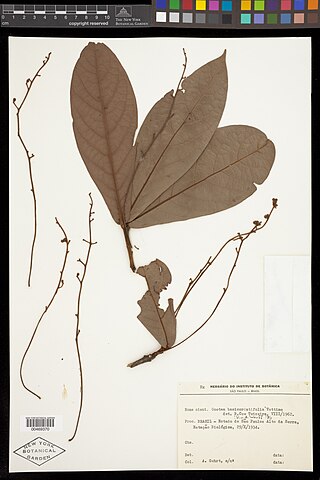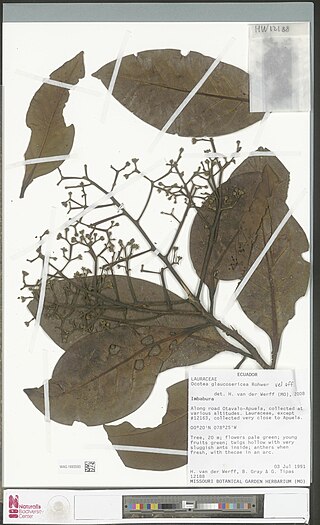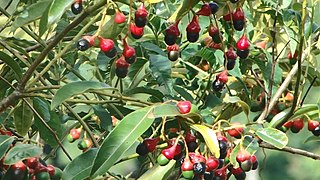
Ocotea is a genus of flowering plants belonging to the family Lauraceae. Many are evergreen trees with lauroid leaves.

Ocotea basicordatifolia is a species of Ocotea in the plant family Lauraceae.

Ocotea catharinensis is a member of the plant family Lauraceae. It is a slow-growing evergreen, a valuable hardwood tree of broad ecological importance, and it is threatened by habitat loss and by overexploitation for its timber and essential oils.

Ocotea clarkei is a species of Ocotea in the plant family Lauraceae. It is an evergreen tree that is endemic to the Mexican state of Chiapas.

Ocotea glaucosericea is a species of plant in the family Lauraceae. It is an evergreen tree in the genus Ocotea. It is found in Costa Rica and Panama.
Ocotea jorge-escobarii is a species of plant in the family Lauraceae.

Ocotea kenyensis is a species of plant in the family Lauraceae. It is found in the Democratic Republic of the Congo, Eswatini, Ethiopia, Kenya, Malawi, Mozambique, Rwanda, South Africa, Sudan, Tanzania, Uganda, and Zimbabwe. It is threatened by habitat loss.
Ocotea langsdorffii is a species of plant in the family Lauraceae.
Ocotea otuzcensis is a species of tree in the family Lauraceae. It is endemic to Peru and considered as a vulnerable species by the IUCN.

Ocotea porosa, commonly called imbuia or Brazilian walnut, is a species of plant in the Lauraceae family. Its wood is very hard, and it is a major commercial timber species in Brazil.

Ocotea odorifera is a species of plant in the family Lauraceae. It is an evergreen tree in the genus Ocotea.

Ocotea puberula is a species of evergreen tree in the plant genus Ocotea of the family Lauraceae. It is found in Argentina, Brazil, French Guiana, Guyana, Mexico, Peru, and Suriname.
Ocotea rivularis is a species of evergreen tree in the plant genus Ocotea of the family Lauraceae. It is endemic to Costa Rica.
Ocotea robertsoniae is a species of evergreen tree in the plant genus Ocotea of the family Lauraceae. It is endemic to Jamaica.
Ocotea staminoides is a species of evergreen tree in the plant genus Ocotea of the family Lauraceae. It is endemic to Jamaica.
Ocotea uxpanapana is a species of plant in the family Lauraceae. It is a species of evergreen tree in the genus Ocotea.
Portlandia harrisii is a species of plant in the family Rubiaceae. It is endemic to Jamaica.
Rondeletia harrisii is a species of plant in the family Rubiaceae. It is endemic to Jamaica.
Schoepfia harrisii is a species of flowering plant in the Schoepfiaceae family. It is a small tree or shrub, growing two to five metres tall. It is endemic to Jamaica, where it is only known to occur in the parishes of Trelawny and Clarendon, in what is known as Cockpit Country, a region of many steep, rounded, limestone hills, shaped like an egg-carton. Here it grows on crags in moist woodland, between 600 and 900m in elevation.
Zanthoxylum harrisii is a species of plant in the family Rutaceae. It is endemic to Jamaica. It is threatened by habitat loss.










